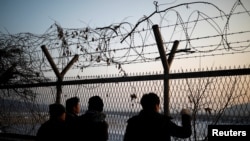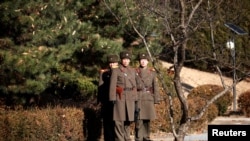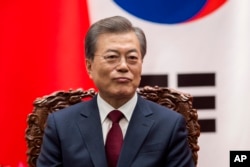Another North Korean soldier and two fishermen defected to South Korea on Thursday, which could be a sign that international sanctions intended to punish the leadership in Pyongyang are imposing harsh economic hardships on ordinary people.
South Korean guards fired up to 20 warning shots at North Korean troops that were in pursuit of the soldier who defected across the heavily militarized demilitarized zone (DMZ) that separates the two Koreas, according to the South Korean Yonhap news agency.
South Korea’s Joint Chiefs of Staff spokesman Roh Jae-cheon confirmed that a low-ranking soldier crossed the border in the midwestern region of the country on Thursday morning, but clarified that no shots were fired at the defecting soldier.
“The army has safely secured the defector, and the relevant authorities will investigate the reasons and procedures for the defection,” Roh said.
Rising numbers
He is the fourth soldier and one of 15 North Korean asylum seekers overall to cross directly into the South this year. In 2016 one soldier and four civilians crossed the DMZ to defect to the South. Most of the estimated 30,000 defectors, who have fled to South Korea since the end of the Korean War in 1953, have escaped through China.
In November, a North Korean soldier was critically wounded when North Korean border guards fired upon him as he ran across the DMZ to defect to the South. Surveillance cameras captured his dramatic escape and rescue by South Korean forces.
In addition to being shot five times, the soldier suffered from a parasitic worm infestation and chronic liver infection, the doctors who saved his life said, indicating perhaps poor health conditions prevalent in North Korea.
Fishermen found
The South Korean Unification Ministry said Wednesday that maritime police found two North Korean men drifting in a small boat off the coast. The two men requested asylum in South Korea and authorities are investigating their identities and claims, a ministry official said.
Also in Japan, a number of ships containing dead bodies have washed ashore this year. Analysts speculate the ships, presumed to be fishing vessels from North Korea, did not have enough fuel to safely return home
Sanctions’ impact
There is increasing concern the United Nations sanctions imposed on the Kim Jong Un government for continuing to test nuclear weapons and ballistic missiles, are causing food and fuel shortages and making economic conditions even worse for the estimated 70 percent of the North Korean population living at the edge of poverty.
In an effort to cut off funding for North Korea’s nuclear program, the most recent round of sanctions prohibits the estimated $800 million textile export industry, reduces oil imports by a third. They also include a ban on the country’s $3 billion coal, iron, lead and seafood exports, which are believed to directly fund the North Korean military.
“These (minerals) have been banned and are no longer being sold, and it has become difficult to feed soldiers. So it is obvious for hungry soldiers to try to defect,” said Ahn Chan-il, a North Korean defector and president of the World Institute of North Korea Studies.
Tomás Ojea Quintana, the U.N. Special Rapporteur on the situation of human rights in North Korea, recently said he is investigating claims the sanctions were making it more difficult for humanitarian organizations to provide food and medical aid to vulnerable populations in North Korea.
“I have to raise awareness with the members of the Security Council that they also have the responsibility to prevent the detrimental impact of sanctions,” Quintana said.
In September, South Korea announced plans to donate $8 million to help the World Food Program and United Nations Children’s Fund to provide food and medicine to North Koreans in need.
South Korean President Moon Jae-in has tried to balance support for sanctions with efforts to increase engagement and dialogue with the North to improve relations.
Some critics say this type of aid will lessen the effect of the sanctions and help stabilize the Kim government as it continues to develop nuclear weapons.
U.S. President Donald Trump has called Moon’s outreach efforts “unworkable appeasement.”
The North Korean government has rejected earlier offers of direct assistance and cooperation from Seoul.
Youmi Kim in Seoul contributed to this report.






